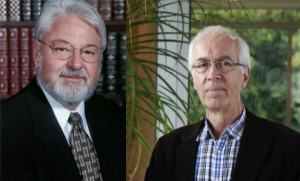
Long-time friends and Coenzyme Q10 researchers Dr. William Judy (left) and Dr. Svend Aage Mortensen (right)
It was a very sad and unexpected loss in the field of bio-medical research when Dr. Svend Aage Mortensen died on April 22, 2015, of infection and complications following heart valve replacement surgery in Copenhagen.
Dr. William Judy and Dr. Svend Aage Mortensen were long-time friends and contemporaries in the field of Q10 research. Both men knew and admired and worked with Dr. Karl Folkers. Dr. Folkers had, already in the early 1970s, reported on research showing a positive correlation between a deficiency of Coenzyme Q10 and the incidence of heart disease.
Clinical data showing the efficacy of Q10 supplementation
The friendship and cooperation between Dr. Judy and Dr. Mortensen was forged out of adversity and necessity. In the late 1980s and early 1990s, the US Food and Drug Administration (FDA) tried to block the sales of Coenzyme Q10 in the United States. Both Dr. Judy and Dr. Mortensen presented clinical data to the FDA showing that Q10 supplementation was positively correlated with the following beneficial effects:
- significant reductions in cardiovascular mortality
- lessening degrees of heart failure
- improved survival rates (1,2,4,7)
Dr. Judy remembers that many of the heart failure patients in the USA had relapses when they were taken off the Q10 supplementation (5). Some died when they were no longer receiving the Q10 supplement.
Coenzyme Q10 to prevent energy starvation in the heart
Both Dr. Judy and Dr. Mortensen got very involved in sending documentation to the FDA to show that Coenzyme Q10 was and is an effective means of preventing the energy starvation of the cardiac cells of chronic heart failure patients.
Memories of Dr.Svend Aage Mortensen
Dr. Mortensen and his wife stayed with Dr. Judy and his family in Bradenton, Florida, and in Indianapolis, Indiana. The memories that Dr. Judy has of his friend and colleague are memories of a man whose professional interests were cardiology and patient care and Coenzyme Q10 research and whose private interests were his family and his music.
Dr. Judy remembers well that Dr. Mortensen especially liked to sing and often sang in the church choir in Indianapolis. When he was young, Dr. Mortensen had been a member of a famous Danish boys’ choir.
In 1986, Dr. Mortensen trained at St. Vincent’s Hospital in Indianapolis in percutaneous coronary angioplasty. Percutaneous procedures are procedures in which the surgeon gains access to the heart or other organs by use of needle-puncture of the skin as opposed to procedures involving the use of a scalpel to cut open the patient. While he was at St. Vincent’s, Dr. Mortensen taught the cardiologists there to do cardiac biopsies.
At that time, Dr. Judy was a professor of physiology at the Indiana University School of Medicine. He and his family had gotten to know Dr. Mortensen quite well, and, of course, the two men had their research interest in the safety and efficacy of Q10 in common. Over the years, the two researchers kept in touch with one another and saw one another at international conferences.
Coenzyme Q10 to militate against reperfusion injury
Dr. Mortensen had worked with Dr. Whitman, a heart surgeon at the Thomas Jefferson University’s Medical College in Philadelphia. Their work had focused on the use of Coenzyme Q10 in myocardial preservation and in the prevention of reperfusion injuries to the heart,
Reperfusion injury, in the context of heart transplantation, refers to the additional damage that is done to heart tissue when the flow of blood is restored to tissues that have already suffered damage from a shortage of oxygen and glucose. Reperfusion injury can influence negatively the outcome of the heart transplantation, and, consequently, it is thought that pre-treatment of the heart transplant patient with Q10 supplements can protect the heart muscle tissue against the free radicals that cause the damage.
Coenzyme Q10 deficiencies seen in rejected transplanted hearts
Dr. Judy remembers too that Dr. Mortensen worked with Dr. Jan Karlsson of the Department of Clinical Physiology, Karolinska Institute, in Stockholm. Dr. Karlsson had shown that rejected transplanted hearts had Coenzyme Q10 deficiencies (3). This was exactly what Dr. Gian-Paolo Littarru, working in Italy, had shown to be the case with kidney transplantation (10).
In Dr. Judy’s opinion, Dr. Mortensen’s work with the heart transplant patients in Denmark should be regarded as award-winning work. The one-year, five-year, and 12-year survival rates for heart transplant patients at Rigshospitalet in Copenhagen (the Danish hospital for highly specialized treatment of patients) were well above the international averages.
Pre-treating heart transplant patients with Coenzyme Q10
Notably, Dr. Mortensen used Coenzyme Q10 as a bridge to cardiac transplantation. Dr. Mortensen’s use of Coenzyme Q10 as a pre-treatment for heart transplant patients demonstrated that Q10 supplementation does not lead to increased bleeding during and after surgery.
Dr. Mortensen told Dr. Judy that it happened that, if a suitable heart had not been found within 120 days, some of the Danish patients – the ones who were taking Coenzyme Q10 supplements while waiting for a heart — could be taken off the transplant list. The obvious conclusion seemed to be that the Coenzyme Q10 supplements had been reducing the severity of the patients’ heart failure.
Dr. Judy told me that Dr. Mortensen, while training in England, was the first heart specialist to show that cardiac mitochondria in heart failure patients tended to colonize out towards the cell membranes and then atrophy and become inactive. Treatment with Q10 supplements reversed this atrophy/inactivity, and the mitochondria migrated back into the heart cells and became active again.
It is for this reason that cardiologists prescribing Q10 supplements see a prolonged and delayed recovery of the heart with Q10 therapy.
Lead researcher on the Q-Symbio study of Q10 in heart failure
Dr. Judy remembers Dr. Svend Aage Mortensen as a very solid and careful investigator. He was the ideal lead researcher and lead author for the Q-Symbio multi-center clinical trial of the efficacy of Q10 treatment of chronic heart failure patients (6).
After Dr. Judy retired from Indiana University and went into contract research with the Southeastern Institute of Bio-Medical Research (SIBR), he and Dr. Mortensen kept up contact with one another, especially during Dr. Mortensen’s visits to the USA. Both Dr. Mortensen and Dr. Judy were skeptical about the advertising claims for the ubiquinol form of Q10 – the claims seemed to be marketing hype – and both men wanted to see research results from well-designed transparent studies instead of marketing claims.
Guidelines-directed adjunctive treatment of heart failure with Coenzyme Q10?
It was Dr. Mortensen’s hope that the results of the Q-Symbio study would lead to guidelines directing the use of Coenzyme Q10 as adjunctive treatment in heart failure (9). He knew, moreover, that 10 of the 13 randomized controlled trials done prior to the Q-Symbio trial had shown improvements in such clinical parameters as their New York Heart Association (NYHA) classification, their exercise capacity, and their quality of life after supplementation with CoQ10. The other three studies, enrolling less than 10 percent of the total participants in the 13 studies, had shown neither benefit nor harm (8).
Read our key article on CoQ10 as adjuvant therapy for heart failure
Sources:
- Judy, W. (1991). Improved long-term survival in Q10 treated congestive heart failure patients compared to conventionally treated patients. Biomedical and Clinical Aspects of Coenzyme Q10; 6, 291-300.
- Judy, W. (1986). Long term management of end stage heart failure with Coenzyme Q10. Biomedical and Clinical Aspects of Coenzyme Q10; 5, 291-303
- Karlsson, J., Liska, J., Gunnes, S., Koul, B., Semb, B., Aström, H., & … Folkers, K. (1993). Heart muscle ubiquinone and plasma antioxidants following cardiac transplantation. The Clinical Investigator, 71(8 Suppl), S76-S83.
- Mortensen, S. A. (1990). CoQ10: Clinical benefits with biochemical correlates suggesting a breakthrough in the management of chronic heart failure. International Journal of Tissue Reactions; 12(3), 155-162.
- Mortensen, S.A. (1986). Clinical decline and relapse of cardiac patients on
coenzyme Q10 withdrawal. Biomedical and Clinical Aspects of Coenzyme Q10; 5, 281-290. - Mortensen, S. A., Rosenfeldt, F., Kumar, A., Dolliner, P., Filipiak, K. J., Pella, D., & … Littarru, G. P. (2014). The effect of coenzyme Q10 on morbidity and mortality in chronic heart failure: results from Q-SYMBIO: a randomized double-blind trial. JACC. Heart Failure, 2(6), 641-649.
- Mortensen, S. A. (1984). Effectiveness of CoQ10 to treat patients with cardiomyopathy and CoQ10 levels in blood and endomyocardial biopsies. Biomedical and Clinical Aspects of Coenzyme Q10; 4, 391-402.
- Mortensen, S. A. (2003). Overview on coenzyme Q10 as adjunctive therapy in chronic heart failure. Rationale, design and end-points of “Q-symbio”–a multinational trial. Biofactors (Oxford, England), 18(1-4), 79-89.
- Mortensen, S. A. (2015). Coenzyme Q10: Will This Natural Substance Become a Guideline-Directed Adjunctive Therapy in Heart Failure? JACC. Heart Failure, 3(3), 270-271.
- Serino, F., Citterio, F., Lippa, S., Oradei, A., Agnes, S., Nanni, G., & Littarru, G-P. (1990). Coenzyme Q, alpha tocopherol and delayed function in human kidney transplantation. Transplantation Proceedings, 22(4), 1375-1378.









Leave A Comment